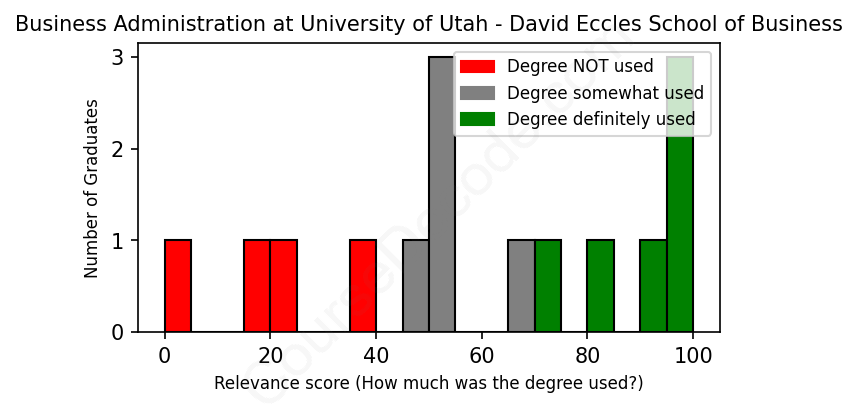
First, some facts. Of the Business Administration graduates from University of Utah - David Eccles School of Business we've analyzed , here's how many have used (or NOT used) their degree in their career:

These are estimates based on AI analysis of 15 LinkedIn profiles (see below).
The verdict? Below average. Overall, with an average relevance score of 59%, Business Administration graduates from University of Utah - David Eccles School of Business have a lower likelihood (-8%) of finding work in this field compared to the average graduate across all fields:
And for comparison, here's the chart for all profiles we've looked at across all degrees.
Also, after graduating, only 26% of these graduates have pursued further education other than another Bachelor's degree (such as a Masters degree or other), compared to the average across all profiles of 35%. This suggests a Bachelors degree is enough for most Business Administration graduates, and it's normal to look for work straight after graduation.
See the details:
|
Relevance score: 94% We think this person has gone into a career highly relevant to their degree. We think this person has gone into a career highly relevant to their degree.
DEGREE INFOGraduated in 2013 from University of Utah - David Eccles School of Business with a Bachelors Degree in Business Administration. No other secondary education since. JOB HISTORY SINCE GRADUATIONQuality Assurance/ Business Administration Pharmachem Laboratories, Inc. 2014 - 2015 Dropbox Business Sales Representative  MarketStar Nov 2015 - Present ABOUTNo information provided. |
The top 10 most common jobs done by the graduates we've analyzed (ranked most common to least) are:
The graduates from the University of Utah's David Eccles School of Business have landed a mix of roles, but it seems that many of them have gravitated toward careers in finance and analysis. Positions like Financial Analyst and roles in financial planning and analysis (FP&A) are quite common, especially among those who graduated around 2012 to 2015. These jobs tap into the financial skills developed during their Business Administration studies, making them highly relevant to their degrees. For example, positions within companies like Qualtrics and Goldman Sachs demonstrate a strong utilization of the financial acumen that a Business Administration program imparts. It’s safe to say that people who ventured into these financial roles are effectively applying their education in practical, impactful ways.
On the flip side, there are quite a few graduates who have taken paths that deviate significantly from their business backgrounds. Many worked in roles that focus on logistics, healthcare, and even teaching, where the direct application of business knowledge is minimal or nonexistent. For instance, jobs like Direct Care Staff, Administrative Supervisor, and even Line Cook do not emphasize the business principles they learned in school. This creates a mixed bag when evaluating how relevant their jobs are to their degrees. While the finance-focused positions validate the effectiveness of a Business Administration degree, other graduates are finding their skills applied in more tangential ways, or sometimes not at all, leading to a blend of strong relevance and stark disconnect in career alignment post-graduation.
Here is a visual representation of the most common words in job titles for Business Administration graduates (this is across all Business Administration graduates we've analyzed, not just those who went to University of Utah - David Eccles School of Business):

Graduates from the University of Utah's David Eccles School of Business seem to have a pretty solid start to their careers, especially early on. Many of the recent grads often land roles that are either directly tied to finance, sales, or management in the business world. For example, graduates from the 2012-2014 range frequently ended up in positions like financial analysts, account managers, or various roles in tech companies. It emphasizes a trend where these grads are initializing their careers in fields that are relevant to their degree, which is a great sign if you're considering this path. Five years down the line, many of them are climbing the corporate ladder, taking on managerial positions or specialized roles in various industries, especially tech and finance.
However, there are also some who seem to have wandered off a bit from the business path. For instance, graduates from around 2013 to 2019 show a mix of job choices, including more service-oriented roles or jobs that don’t directly relate to their business degree, like working as caregivers or in health services. While this still offers valuable experience, it's not necessarily what you'd expect from a business administration program. Overall, while many individuals are thriving in relevant careers, there's a notable split, with some taking a detour into other sectors. So, if you're serious about staying in business, it might be worth focusing on internships and experiences that align closely with your career goals straight out of college.
Honestly, getting a Bachelor’s degree in Business Administration can be a bit of a mixed bag, and the experience at the University of Utah's David Eccles School of Business is no exception. Generally, it's not the easiest major out there; you'll dive into a mix of core classes like finance, marketing, and management, which can be challenging if you're not into numbers or in-depth analysis. Plus, the workload can ramp up, especially when you have group projects and presentations to juggle. That said, if you’re organized and passionate about the subject, many students find it manageable and even enjoyable. It's definitely a step up from some easier majors, but with the right mindset and support, you can totally handle it!
Most commonly, in the LinkedIn profiles we've looked at, it takes people 2 years to finish a Bachelor degree in Business Administration.
Looking at the career journeys of these Business Administration graduates from the University of Utah, it seems that some of them have definitely found ways to make decent money, especially those with roles at companies like Qualtrics and Goldman Sachs. The first grad has climbed the corporate ladder in finance, hitting managerial positions that typically come with good salaries. On the flip side, others have taken paths that don’t scream big bucks – like the ones working in caregiving and food services – which can be less lucrative options despite their degrees. Overall, it's a mixed bag, but there are definitely some shining examples of success here!
Here is a visual representation of the most common words seen in the "about" section of LinkedIn profiles who have a Bachelor degree in Business Administration (this is across all Business Administration graduates we've analyzed, not just those who went to University of Utah - David Eccles School of Business). This may or may not be useful:

Here are all colleges offering a Bachelor degree in Business Administration (ordered by the average relevance score of their Business Administration graduates, best to worst) where we have analyzed at least 10 of their graduates: